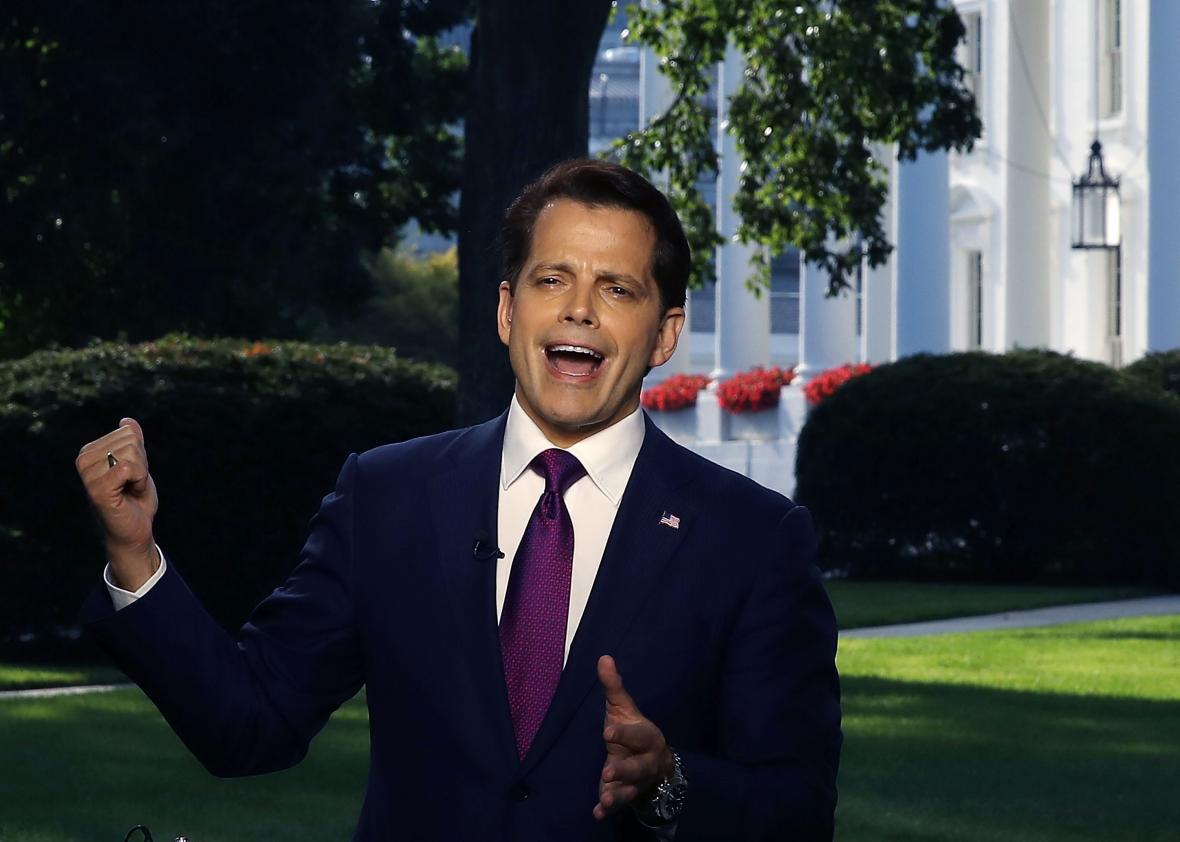On the first day of his all-too-brief tenure as White House communications director, Anthony Scaramucci offered some soothing words about his new workplace. “I think what you’d find is that there’s a lot less palace intrigue than is getting reported about,” he told reporters in the press room, adding, “We all genuinely like each other.”
We all know what happened next. Scaramucci’s 10 days on the job consisted of nothing but palace intrigue, highlighted by his vulgar tirade to the New Yorker’s Ryan Lizza about punishing leakers, the removal of Reince Priebus as chief of staff, and the Mooch’s own ouster at the hands of Priebus’ replacement John Kelly.
Palace intrigue is an enticing expression to describe such behind-the-scenes machinations, and commentators have had a hard time avoiding it in the Trump era. The Factiva news database reveals more than a thousand Trump-related uses of palace intrigue or palace intrigues this year, 360 in the month of July alone. And I’m hardly immune: The words palace intrigue appeared in the very first sentence of my Wall Street Journal column last week, about talk of “kill lists” from the White House to Westeros.
Palace intrigue is quickly joining the ranks of other overused terms like horse race in the lexicon of political reporting. And as with horse race, it often gets invoked as a critique of how journalists cover politics, obsessing over gossipy details rather than meaty policy issues. But as Callum Borchers recently observed in the Washington Post, when it comes to the Trump White House, “palace intrigue actually does matter.”
But how has palace intrigue become such a popular phrase anyway? Why does this monarchic-sounding expression keep coming up to describe goings-on in our (ostensible) democracy? The origins are a bit mysterious: No major English dictionary, from the Oxford English Dictionary on down, includes an entry for palace intrigue, though it has been in the language for nearly two centuries, with equivalents in other European languages going back even further.
The roots of palace intrigue are, as you might have guessed, French. English borrowed both words in the phrase from French: palace from palais and intrigue from a word that used to be spelled intrique, in turn taken from the Italian verb intrigare, meaning “to plot.” The two words first came together in French by the 17th century: A 1629 polemic against Roman Catholicism by the Protestant writer Charles Drelincourt makes mention of “an advocate embroiled in the intrigues of the palace” (“un Advocat qui s’embarasse dans les intriques du Palais”).
As intrigues de palais became a set phrase in French, counterparts sprang up in other languages, such as intrigas de palacio in Spanish. It was originally rendered in English as intrigues of the palace: In the first volume of The History of the Decline and Fall of the Roman Empire, published in 1776, Edward Gibbon relates that “secret intrigues of the palace” are among “those trifling but decisive causes which so often influence the fate of empires.”
We likely owe the more compact expression palace intrigue to the German equivalent, Palast-Intrigue, in print since at least 1808. One early example appeared in an 1825 account of a foiled insurrection in Spain. A seized document laid out a “plan of a future Government, solid and stable … which may not be subject to the chances and variations resulting from palace intrigues.” Two years later, a correspondent for the Times of London reported from Lisbon that one Portuguese nobleman, the Viscount of Vila Nova de Cerveira, was “one of the permanent pivots of all palace intrigues.”
Indeed, the vast majority of the 19th-century uses of palace intrigue, singular or plural, had to do with countries like Spain and Portugal that still had royal courts. And while palace intrigues often took place in literal palaces, palace became something of a metonym for the governing apparatus of a monarchic or imperial system. So, if the senior members of a ruling group seized control, that was known as a palace revolution (Palastrevolution in German) or a palace coup.
Through the early 20th century, Americans would have only come across the phrase palace intrigue if they were reading dispatches from far-flung lands, like the waning Qing Dynasty in Beijing or the Ottoman Empire in Constantinople. But as these courtly systems of government faded away, terms like palace intrigue or palace politics instead came to be applied to Washington politics, often as a sardonic comment on those jostling for power in the presidential orbit.
In 1943, the syndicated political columnist David Lawrence, a critic of Franklin D. Roosevelt, wrote that there should be “complete separation of Supreme Court justices from any connection, however tenuous, with the so-called ‘palace intrigue,’ which is in another sector of the ‘battle of Washington’ one hears so much about nowadays.”
Toward the end of Harry Truman’s second term as president, in 1952, some excerpts of his personal diaries were published from the forthcoming book Mr. President. “Many Presidents have had what is known as ‘palace intrigue’ or ‘palace bickering,’” Truman wrote in one entry.
Truman’s description still rings true in Trumpian times. “You always find that there is an excellent chance for jealousy and bickering among people who are close to the fount of power,” he wrote. “You have to watch that all the time. Most of the times I have had to make changes in the official family around the White House is when someone gets too big for his breeches, or he makes it unpleasant for those that he has to serve.”
As Trump continues to embody the notion of the “imperial presidency,” the appeal of palace intrigue to describe West Wing power plays will persist, even as John Kelly seeks to make the drama of the executive branch a little less intriguing.
